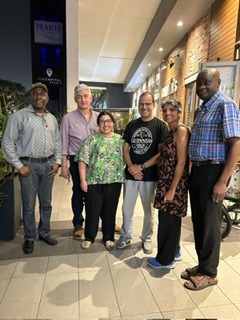
From September 21-27, 2025, a delegation from the University of Alabama at Birmingham (UAB) traveled to South Africa and Zambia to enhance institutional partnerships aimed at improving global health outcomes. The UAB delegation included Alan Tita, M.D., Ph.D., senior associate dean for Global and Women’s Health; J. Victor Garcia-Martinez, Ph.D., chair, UAB Department of Microbiology; J. Martin Rodriguez, M.D., FACP, FIPSA, Paul W. Burleson, M.D., Endowed Professor of Medicine; Rena C. Patel, M.D., MPH, MPhil, associate professor, UAB Department of Medicine, Division of Infectious Diseases, associate director, MHIGH Global Health Research; and Stephen Obaro, M.D., Ph.D., professor, Pediatric Infectious Diseases, associate director, MHIGH Faculty Engagement and Service Initiatives.
The first leg of the trip (September 21-24) was hosted by the Africa Health Research Institute (AHRI) in Durban and Somkhele, South Africa. UAB faculty based at AHRI, including Adrie Steyn, Ph.D., professor, UAB Department of Microbiology and Emily Wong, Ph.D., associate professor, UAB Department of Medicine, Division of Infectious Diseases, showcased ongoing research, particularly in tuberculosis. The visit provided a valuable platform for the UAB team to witness impactful translational research firsthand and explore avenues to expand the longstanding relationship between AHRI and UAB.
“The visit was a wonderful chance to exchange ideas, show UAB leadership my research program, and strengthen partnerships in a difficult year for global health.” said Wong.
From September 24-27, the delegation visited the Centre for Infectious Disease Research in Zambia (CIDRZ), where they were welcomed by UAB-affiliated faculty Carolyn Bolton-Moore, Ph.D., associate professor, Department of Medicine, Division of Infectious Diseases and Albert Manasyan, M.D., associate professor, Department of Pediatrics, Division of Neonatology; and Mike Vinikoor, M.D., professor, Department of Medicine, Division of Infectious Diseases.
Topics included CIDRZ’s robust research and program portfolio in HIV, TB, maternal and newborn health, enteric diseases, and social sciences. Discussions centered around expanding research collaborations in areas such as mental health and safe motherhood.
“This visit will give UAB faculty interested in global health the opportunity to partner with faculty at CIDRZ to co-develop and co-design rigorous clinical trials in Zambia and/or Alabama,” said Manasyan.
Across both sites, the visit served to align institutional priorities, identify shared goals, and examine infrastructure supporting research, education, and service. It also included visits to U.S. consular offices to discuss the broader role of diplomacy in global health engagement.
“This trip was deeply meaningful for me, not only as a scientist but as someone committed to building bridges across continents,” said J. Victor Garcia-Martinez, Ph.D., professor and chair, Charles H. McCauley Endowed Chair in the Department of Microbiology. “Seeing firsthand the incredible work at AHRI and CIDRZ reminded me why global partnerships matter. For basic science departments like Microbiology that have faculty members working at these sites, these collaborations are essential. They allow us to translate fundamental discoveries into real-world solutions for some of the most pressing health challenges. It was inspiring to witness how the commitment from our faculty to science, medicine and education can create impact far beyond our own labs.”
This partnership-focused visit reaffirmed UAB’s commitment to sustainable, collaborative global health initiatives. With renewed energy and strengthened ties, faculty and leadership from UAB, AHRI, and CIDRZ are poised to co-create impactful solutions to some of the most pressing global health challenges.